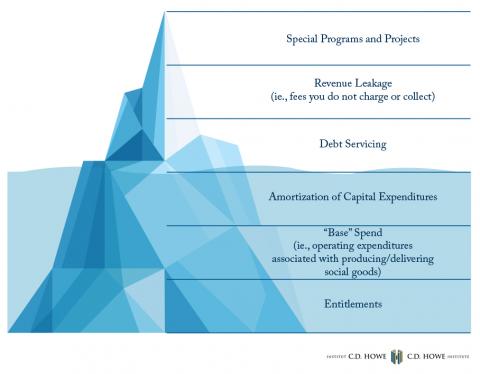From: Michael Lindsay
To: Premier-Designate Doug Ford
Date: June 29, 2018
Re: Navigating icebergs en route to a balanced budget
In the recent election campaign, you expressed a desire to move in a “modest and responsible” way towards the elimination of Ontario’s deficit.
The causes of the province’s deficit are structural. Eliminating the deficit will require a comprehensive and thoughtful approach. Allow me to share a framework that might prove helpful.
Imagine the province’s expenditures as an iceberg (see figure). Above the surface are the things that are (relatively) easy to see and (relatively) easy to address. The things below the surface are less visible, and harder to quantify or target, but they have a significantly bigger impact on costs.
Terminating special programs, and preventing revenue leakage, is the traditional focus of deficit reduction initiatives. This will make a dent, but it won’t add up to $6-$12 billion in annual savings.
When it comes to the interest on the deficit (currently $12.5 billion per year) and the amortization of capital assets, you can only really play defence. Prevent credit downgrades via a public and transparent commitment to prudence. Rigorously question the need for new capital spending, keeping in mind that the net book value of Ontario’s assets has grown 6 percent annually between 2012-2013 and 2016-2017. There is little doubt that we need new infrastructure to drive economic growth, but it all goes on the government’s credit card.
I think of the “base spend” of government as the operating costs involved in producing or delivering social goods. It is a fact that these costs are disproportionately found in healthcare and education, and that they are largely driven by wages. But rather than seeking percentage reductions in budgets, sustainable and significant savings will come when you figure out how to do things differently. Your forthcoming audit of government spending would be even more powerful if it explicitly addressed these questions.
Be forewarned: even the most seemingly obvious outsourcing opportunity within government (e.g., integrating multiple government contact centres) will likely yield a maximum savings of $10-$20 million per year. Each attempt to reshape the process of delivering social goods will come with its own political challenges.
With respect to entitlements, the political exposure is even more acute. Data are once again your friend, and it is often missing from this discussion. I do not believe that government has a consolidated picture of the various entitlements flowing to various constituencies (e.g., seniors, students). Rather than debating the richness of specific entitlements, I believe you would be well served to begin by getting information and taking the conversation up a level. Are we comfortable as a society with the aggregate level of entitlements being paid to various groups? Are we convinced that we are meaningfully changing life quality (or opportunities) with the entitlements being provided? More productive conversations about rationalizing entitlements will flow from this kind of examination.
Michael Lindsay is a C.D. Howe contributor/speaker on the topics of government efficiency, public private partnerships, and alternative service delivery.
To send a comment or leave feedback, email us at blog@cdhowe.org.
The views expressed here are those of the author. The C.D. Howe Institute does not take corporate positions on policy matters






